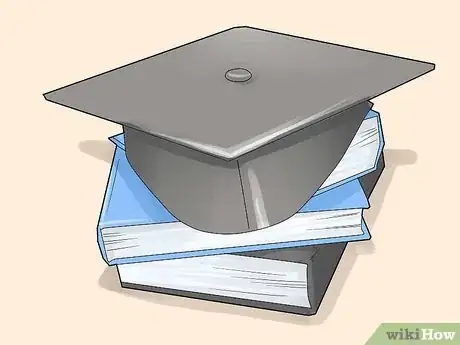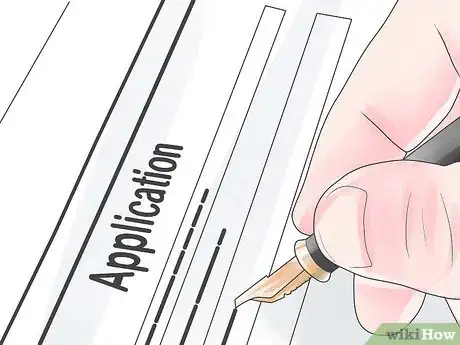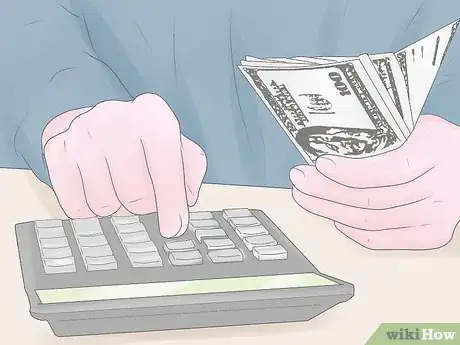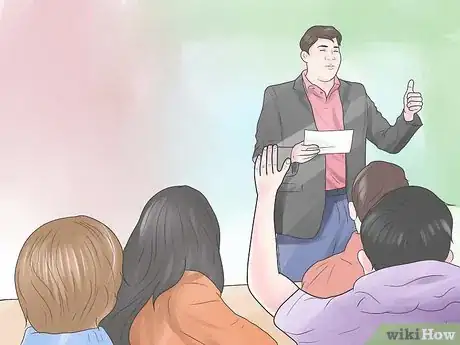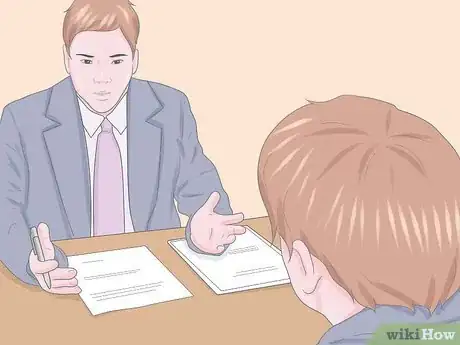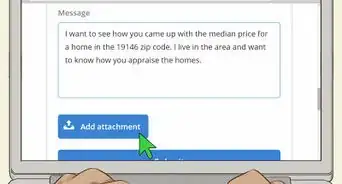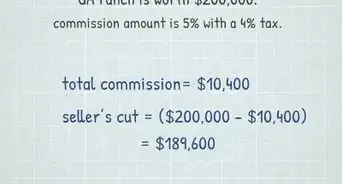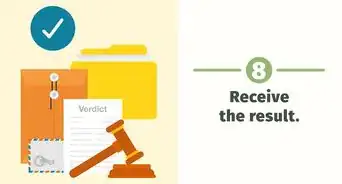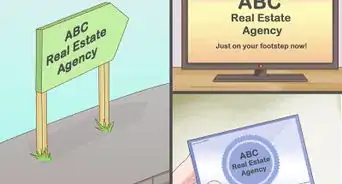This article was co-authored by Nathan Miller. Nathan Miller is an entrepreneur, landlord, and real estate investor. In 2009, he founded Rentec Direct, a cloud-based property management company. Today, Rentec Direct works with over 16,000 landlords and property managers across the United States, helping them manage their rentals efficiently.
There are 9 references cited in this article, which can be found at the bottom of the page.
This article has been viewed 54,962 times.
The real estate industry is one of the most dynamic industries to be in. For many people it is an attractive business to enter because of potential high profits and flexible work hours. In addition, barriers to entry are generally low compared to other white collar professions and industries. But ultimately, getting a real estate sales agent license is a somewhat complicated (and potentially time consuming) process that requires patience and a good bit of effort.
Steps
Taking the State Exam and Applying for Your License
-
1Find the official website of your state’s real estate regulatory body. Every state has a regulatory body that governs real estate laws and real estate sales agents within its jurisdiction. The website of your state’s regulatory body will explain all of the specific requirements that you’ll have to meet to become licensed in that jurisdiction.
- Go to USA.gov to find the official website for your state.
- Oftentimes, state real estate regulatory bodies are under the division of commerce, insurance, or business regulation.
- Feel free to visit your state’s regulatory body offices in person. You might learn more talking to someone than if you try to figure things out on the internet.[1]
-
2Choose a real estate education school. Your state’s real estate regulatory body will provide you with a list of state-approved schools and real estate education courses that meet their requirements for licensure. Make sure to read this list carefully so that the school you pick is indeed a school that is approved by the state.Advertisement
-
3Enroll in the real estate education course. After you’ve selected an approved school and course, enroll in the course. Real estate education courses are the primary educational requirements for real estate licensing in most states. As a result, these courses are very important and required. Take your course work seriously.
- Real estate education courses can be completed in person or online, depending on the school that offers them.
- Courses generally take between 30 and 90 hours, depending on your state requirements.
- Courses are generally concluded with a course exam. This is different than the state real estate exam. The course exam is created to make sure you’ve done the work on the course and understand what you have learned.
-
4Complete the real estate education course. Completing the course is no simple task. If you complete it online, you’ll move through a dozen or more modules that will include a wide variety of information. If you complete it in person, you’ll spend a week or more in a classroom for eight hours a day (depending on the hour requirement). Make sure to read or listen carefully, take good notes, and review all of the information you’ve covered. Generally, these courses include information on:
- Credit scores
- Risk management
- Foreclosures, short sales, real estate owned properties (REO) and real estate auctions
- Real estate ethics
-
5Study hard for your state exam. After you've completed and passed the real estate education course, you'll need to prepare for your state exam. State exams are difficult and many people don’t pass the exam the first time around. You’ll increase your chances of passing the test if you are thoroughly prepared. There are books and online resources that you can use to study. Take as many practice tests as you can until you are confident you can pass the examination. Search online or ask your school to recommend real estate prep examinations. [2]
- Keep in mind that each state exam is different. Take practice exams only for the state in which you will be licensed.
-
6Register for and take the state exam. Depending on the state, you’ll either have to forward your course completion information to the state or testing company, or you’ll be automatically scheduled for a state exam once you complete the course. Either way, the state exam will be the culmination of your real estate education.
- Most states require either a 70% or 75% score to pass the exam.
- Exams are held in testing centers and generally take several hours.
- Many states allow you to retake the exam several times.
- You might be required to arrive up to 30 minutes before the exam begins.
- Make sure to bring photo ID.
- Your test results will, in many states, be automatically sent to the regulatory authority.
-
7Apply for your license. After you’ve taken the appropriate education and passed the exam, you need to formally apply for your license. Some states might have you begin the application process before taking the exam, but many do not allow you to apply until you’ve passed the exam. Regardless, after you’ve passed your exam, you will have to contact the regulatory agency in your state that governs real estate.
- Make sure you have the appropriate forms.
- Contact the regulatory authority to make sure they’ve received the results of your test and your education completion.
- You’ll probably have to pay a license fee at this stage.
- The amount of time it takes the state to process your application will vary. Some states like Florida process applications almost instantly, while other states like Tennessee might take two weeks or longer.
Learning the Basic Requirements of Licensure
-
1Understand basic requirements to enter real estate sales. Each state has different requirements, and your real estate license is only good in the state that has granted it. Regardless of where you live, however, you must meet the basic requirements:
- You must be at least 18 years old.
- You must be a high school graduate.
- You must have a Social Security number.
- You must satisfactorily pass the state licensing examination in the state you want to work. (There is no such thing as a National real estate license.)
- Generally, most states require you to take a real estate education course that familiarizes you with common practices and state laws that govern the real estate market.[3]
-
2Save enough money to pay for related costs of licensing. The cost of licensing in every state varies, but generally costs are very similar; however, costs go beyond state fees for licensing and include a number of things. Prepare yourself to pay for:
- A real estate education course. This could range from $200 to $500 per course. Some states require multiple courses.
- A real estate exam fee. Real estate exam fees range from $30 to $120 depending on the state.
- Fingerprinting and a background screening. Fingerprinting and screening can cost between $30 and $60.
- State licensing fees. These fees can range from $10 to over $100.
- Errors and omissions insurance. This can range from $125 a year to much higher depending on coverage.
- Association or board dues. These fees can be anywhere from $300 a year to $1,000 or more.
- Some states, like Texas, require good standing on any student loans guaranteed by the state before you can obtain your license.
- MLS and electronic key charges. These fees can range from $25 a month to $100. [4]
-
3Learn about affiliation with a real estate company or broker. In most states, in order for your license to be active and valid, you need to be affiliated with a real estate broker and sign up with them as an independent contractor. If you’re not affiliated with a broker and you practice real estate, you might be breaking the law and could be subject to heavy fines.
- Real estate sales agents can’t practice real estate on their own and must be supervised by a broker.
- In many places, a broker won’t accept you on unless you’ve joined the board or association to which they belong. This is often a requirement of many boards and associations.
- The broker is charged with supervising and overseeing all of their agent's activities.[5]
-
4Investigate whether you need to join a real estate board or association. Most regions of the country have real estate boards or associations which you’ll have to join to gain many of the tools to practice real estate in your area. Real estate boards and associations offer:
- Education courses that help you keep your license and expand your certification.
- A way to meet and build connections with other real estate sales agents.
- Access to the multiple listing system for the region. The multiple listing system is a system in which real estate sales agents post their listings with specifics and is often accessible only by other real estate sales agents.
- Access to electronic key systems that allow entry to homes. This is extremely important if you want to show a home to a customer/client.[6]
-
5Know what it means to be a “Realtor.” The term “Realtor” is a trademarked term by the National Association of Realtors (NAR). While all Realtors are real estate sales agents, not all real estate sales agents are Realtors. The term Realtor indicates membership in local real estate associations/boards and the NAR. Benefits of being a Realtor or doing business with a Realtor include:
- Realtors are bound by a specific code of conduct and ethics enforced by the NAR.
- Realtors have access to tools like the multiple listing system (MLS) and more than distinguish them from real estate sales agents.
- The term “Realtor” is a branded term that the NAR has worked hard to associate with honesty and integrity.[7]
Starting Your New Career
-
1Find a broker. After you’ve applied for your license, you should start looking for a firm and a broker to work for. In most places it is illegal for you to practice real estate on your own. This is because it is the duty of an experienced broker (someone who has practiced real estate for more than three to five years) to supervise you and mentor you.
- Sign the independent contractor agreement with your broker.
- Shop around for a broker. Some firms and brokers charge their agents fees “desk fees” (a monthly fee to use their office and supplies). Some firms and brokers allow generous commission splits (for instance, you take 90% of the commission you earn, and they take 10%). In addition, the culture and interest level of brokers vary. Find a firm and broker you are comfortable working with.
- Maintain a good relationship with your broker, as he or she will be invaluable to your success.
- You’re not a real estate sales agent until you’ve signed on with a broker.
- You’re not a Realtor until you’ve signed on with a broker and your local association or board.[8] [9]
-
2Purchase errors and omissions insurance if required by your state. Errors and omissions insurance is insurance that protects you, the real estate sales agent, from liability if you make an error or omit something from a contract when conducting business. Some states require individuals to purchase their own insurance, or show proof of coverage, before they are granted their license and start practicing.[10]
-
3Keep abreast of changes in your career field. Once you’ve got your license and are signed up with a firm, you need to keep up to date on changes in real estate law and practice. This is important, as regulatory agencies and state legislatures are always changing laws. To be successful, you need to know the law and know it well. You also need to understand common practices and other things that will benefit your customers.
- Complete education hours required by your state. These range from nine to 14 hours every year or two, though agents renewing for the first time may be required to complete up to 45 hours of courses.
- Complete education hours required by your local board or association. These range from none to 12 or more.
- Attend conferences and conventions. At conferences and conventions you’ll hear experienced Realtors talk and you’ll have the chance to attend workshops and courses that will benefit you immensely.[11]
Expert Q&A
-
QuestionIs getting real estate license worth it?
 Nathan MillerNathan Miller is an entrepreneur, landlord, and real estate investor. In 2009, he founded Rentec Direct, a cloud-based property management company. Today, Rentec Direct works with over 16,000 landlords and property managers across the United States, helping them manage their rentals efficiently.
Nathan MillerNathan Miller is an entrepreneur, landlord, and real estate investor. In 2009, he founded Rentec Direct, a cloud-based property management company. Today, Rentec Direct works with over 16,000 landlords and property managers across the United States, helping them manage their rentals efficiently.
Property Management Specialist There are two main times where you need a real estate license: if you’re going to be acting as a realtor — helping other people buy or sell properties, or if you’re going to be helping other owners manage their properties. In both those cases, you need to be licensed in order to handle the transactions.
There are two main times where you need a real estate license: if you’re going to be acting as a realtor — helping other people buy or sell properties, or if you’re going to be helping other owners manage their properties. In both those cases, you need to be licensed in order to handle the transactions.
References
- ↑ http://www.usa.gov/Agencies/State-and-Territories.shtml
- ↑ http://www.dre.ca.gov/Examinees/Preparing.html
- ↑ http://www.dre.ca.gov/Examinees/RequirementsSales.html
- ↑ https://investfourmore.com/2014/06/09/how-much-money-do-you-need-to-save-before-becoming-a-real-estate-agent/
- ↑ https://www.realtor.com/advice/buy/whats-difference-real-estate-salesperson-broker/
- ↑ http://www.realtor.org/membership/how-to-join-nar
- ↑ https://www.realtor.com/advice/buy/whats-difference-real-estate-salesperson-broker/
- ↑ http://nreionline.com/research/real_estate_top_brokerages_12/
- ↑ https://www.realtor.com/advice/buy/whats-difference-real-estate-salesperson-broker/
About This Article
To get a real estate license in the US, you need to be at least 18, a high school graduate, and have a social security number. If you meet these requirements, enroll in an approved real estate education course and do all your homework. After you pass, you can sign up to take your state’s official licensing exam. Study hard, and take practice exams until you’re confident you can meet your state’s minimum score, which is usually 70% or 75%. Once you pass the exam, contact your state’s regulatory agency to apply for your license. To learn how to get your career started after getting your license, keep reading!



